4 ways the Dark Web can help you (It's not all bad!)

Although the Dark Web is most famous for its seedy underworld connections, there are a few advantages. That’s right: Despite the dangers, there are a few unexpected ways it can make your life easier. For example, circumventing censorship is one of the most significant Dark Web upsides.
If you explore the Dark Web, use a VPN and antivirus software because it has cybersecurity dangers. If you protect yourself adequately, there are ways the Dark Web can help you.
1. Browse the internet privately
Dark Web refers to “onion sites,” which you can’t search for on Google or other standard search engines or browsers. Most Clearnet websites use domains like www.komando.com, which represent different IP addresses.
These IPs identify different sites on the internet. We’re getting into the weeds, but all you need to know is that this central control makes it easy for influential organizations to track you across the web. It also paves the way for censorship.
Bottom line: When you use the Clearnet, you’re browsing at the mercy of those in power. They can shut down websites you rely on, track you across the web and use your data for their purposes. Use this tool to see how websites track you.
Onion sites drop all of this baggage. Dark Web sites let you access the web without using a domain name system (DNS). Thus, you don’t have to worry about censorship — or privacy invasions.
2. Read news stories from around the world
Let’s say you’re traveling. You have to spend some time in a country with heavy government censorship. While there, you realize you can’t access the New York Times, BBC, ProPublica or other news sites.
This is common. Many world leaders want to control their people’s access to information. Luckily, you can access these news publications on the Dark Web. You can use a TOR browser to access the Dark Web. Tap or click here to learn how.
RELATED: Yikes! Watch out for this porn scam that could cost you
3. One of the best Dark Web upsides is how it helps students
Free check to see if your router has been hacked by criminals

The internet is a crazy place. Not only do marketers and advertisers follow your every move, but there are also hackers and scammers lurking in the dark corners, ready to pounce on your personal information.
At least marketers and advertisers want to make money off of you. The hackers and scammers we’re talking about want to flat-out steal your money by hijacking your personal information.